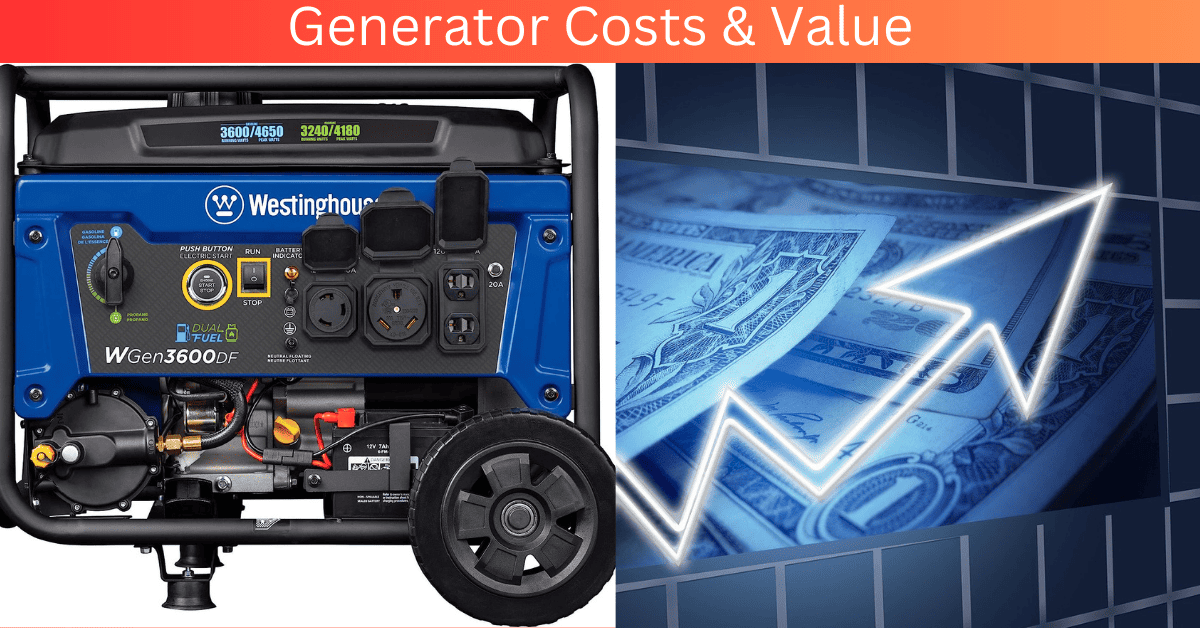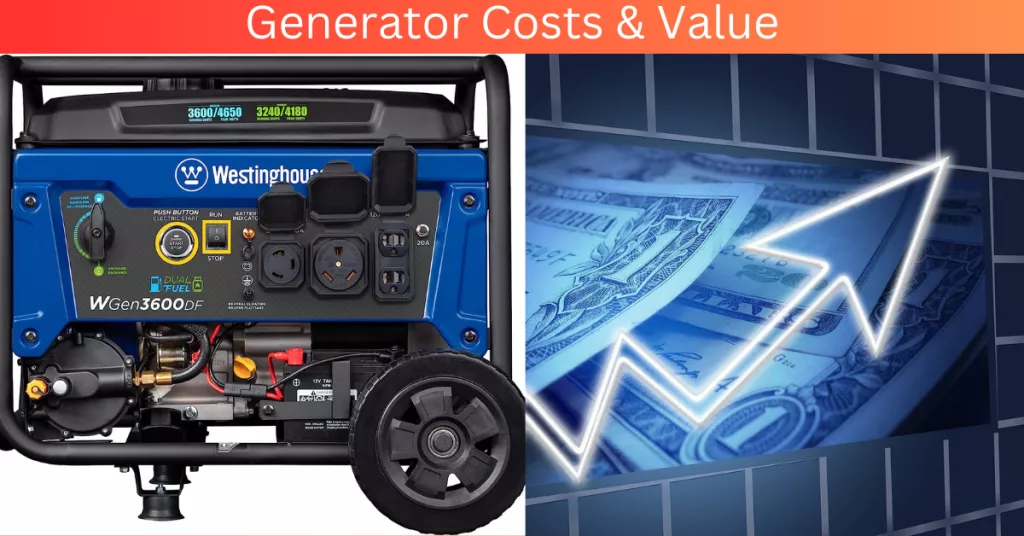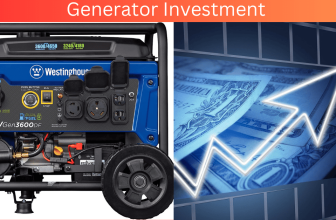
As homeowners, business owners, and outdoor enthusiasts, we all know the importance of having access to reliable power. Whether it’s for keeping the lights on during a power outage, running equipment on a job site, or powering appliances while camping, a portable generator can be a lifesaver.
But with so many options available, it can be difficult to know which generator is the right choice for your needs, and how much you should expect to pay. That’s why we’re exploring the world of power economics, and diving into the cost and value of portable generators.
As we delve into this topic, we’ll explore the many factors that can affect the cost of a portable generator, from the size and power output to the brand and features. But we’ll also take a closer look at the value that generators provide, beyond just the initial purchase price.
We’ll consider factors like fuel efficiency, ease of use, and reliability, and how these can impact the long-term value of your investment. So whether you’re a seasoned generator user or just starting to explore your options, join us as we uncover the economics of portable power and help you make informed decisions about your next generator purchase.
Key Takeaways
- Investing in a high-quality generator can be more reliable and cost-effective in the long run.
- Proper maintenance is crucial for longevity and peak performance, and following a maintenance schedule can catch potential problems early and save money in the long run.
- Assess power needs by identifying essential appliances and devices, determining their wattage, and considering fuel source and noise level restrictions.
- Long-term costs include fuel, maintenance, repairs, insurance, replacement parts, and resale value, so specific needs should be considered when comparing cost and value.

The Importance of Portable Generators
You can’t afford to be without a portable generator in today’s unpredictable world. Power outages can happen anytime, anywhere, and for various reasons. A portable generator can be your lifesaver during emergencies, providing you with the power you need to keep your home or business running smoothly.
It allows you to stay connected, stay warm, and stay safe even when the power goes out. The importance of a portable generator goes beyond just emergencies. It can also provide you with convenience and comfort during outdoor activities like camping or tailgating. You can use it to power up your RV, charge your devices, or run your appliances. With a portable generator, you can enjoy the great outdoors without sacrificing the comforts of home.
Factors affecting cost include the type of fuel the generator uses, the size and capacity of the generator, and the features it offers. But don’t let cost be the only factor in your decision-making process. When it comes to purchasing a portable generator, you need to consider both the cost and value it provides.
In the next section, we’ll explore the different factors affecting the cost and value of portable generators.
Factors Affecting Cost
One factor that significantly impacts the price of these devices is the quality of their components, with higher-end components increasing the overall cost. When it comes to generators, the quality of their engine, alternator, and control panel can affect their performance and durability. Cheaper components may save money in the short term, but they may wear out faster and require more repairs or replacements in the long run.
Another factor that affects the cost of portable generators is their fuel efficiency. A generator that can run for longer periods on less fuel will be more expensive upfront, but it’ll save money in the long term by reducing the need for frequent refueling. Additionally, generators with more features like automatic shut-off, noise reduction, and remote start will also come at a higher cost.
The size and wattage of a generator can also impact its cost. Larger generators with higher wattage capacities will be more expensive than smaller, less powerful models. However, it’s important to choose a generator that can provide enough power for your needs, as running a smaller generator at full capacity for extended periods can cause damage and lead to more frequent breakdowns.
As we consider the cost factors of portable generators, it’s important to remember that price isn’t the only consideration when making a purchase. The value of a generator, including its reliability, efficiency, and performance, is also essential to consider. In the next section, we’ll explore the factors that affect the value of portable generators.
Factors Affecting Value
Looking beyond the price tag, there are several aspects that contribute to the overall worth of a portable generator. While cost is definitely a major factor, the value of a generator is also determined by its features, reliability, and fuel efficiency. These factors can make a big difference in how useful and long-lasting a generator is, and ultimately determine whether it’s worth the investment.
To help you understand what to look for in a portable generator, we’ve created a table that breaks down the key features and benefits of different models. This table includes information about the type of fuel each generator uses, its starting and running wattage, and its runtime at 50% load. Additionally, we’ve included details about the noise level and portability of each generator, as these are important factors to consider when choosing a model that will meet your needs.
When choosing a portable generator, it’s important to think about your specific needs and how you plan to use the generator. For example, if you need a generator that can power your RV or campsite, you may want to choose a model that is lightweight and easy to transport. On the other hand, if you need a generator for emergency backup power at home, you may want to choose a model with a longer runtime and higher wattage output. By considering these factors in addition to price, you can choose a generator that will provide the best value for your needs.
Now that we’ve discussed the factors that affect the value of a portable generator, let’s move on to the different types of generators available on the market.
Types of Portable Generators
Hold onto your seats, because we’re about to dive into the world of various types of generators available on the market! Portable generators come in different shapes and sizes, but all serve the same purpose: to provide electricity.
The most common types of portable generators are conventional generators, inverter generators, and dual fuel generators. Conventional generators are the most affordable type, but they’re also the loudest and least fuel-efficient. They’re best suited for powering large appliances or tools that require a lot of power.
Inverter generators are more expensive, but they’re quieter and more fuel-efficient than conventional generators. They’re also capable of producing clean and stable power, making them ideal for powering sensitive electronic devices.
Dual fuel generators are the most versatile type, as they can run on either gasoline or propane. They’re also quieter and more fuel-efficient than conventional generators.
Now that we know the different types of portable generators, it’s time to choose the right one for our needs. The type of generator that you choose will depend on your power requirements, budget, and desired features. In the next section, we’ll discuss the important factors to consider when choosing the right generator.
Choosing the Right Generator
So, now that we know the different types of portable generators, let’s talk about how to choose the right one.
When assessing our needs, we need to consider the power requirements of the appliances and devices we want to run during an outage. We also need to compare the cost and value of different generators and consider long-term costs such as maintenance and fuel expenses.
Assessing Your Needs
Assessing your power needs can help you determine the appropriate size and type of portable generator for your situation. Before making a purchase, consider the following:
- Identify the essential appliances and devices that need power during a power outage.
- Determine the starting wattage and running wattage of each device to calculate the total wattage needed.
- Consider the fuel source and availability in your area for the generator type you’re considering.
- Determine the noise level restrictions in your area, especially if you plan to use your generator in a residential neighborhood.
Taking these factors into account can help you choose a generator that will meet your power needs and fit your lifestyle. It’s important to remember that having a generator that’s too small can lead to power outages and damage to your equipment, while having a generator that’s too large can result in unnecessary expenses.
To make the best decision, it’s important to compare the cost and value of different portable generators.
Comparing Cost and Value
When it comes to buying a generator, you get what you pay for and sometimes it’s better to invest in quality than to cut corners. Portable generators range in price from a few hundred dollars to several thousand, and the less expensive models may seem like a good deal at first glance. However, cheaper generators often have lower wattage, shorter runtime, and may not be as reliable in the long run.
On the other hand, investing in a high-quality generator may cost more upfront, but it can save you money in the long term by providing reliable power during outages and reducing repair and maintenance costs. When comparing the cost and value of portable generators, it’s important to consider your specific needs.
A generator that is too small or too large for your needs can end up costing you more than necessary. Additionally, you should consider the fuel efficiency and noise level of the generator, as well as any additional features that may be important to you. By taking these factors into account, you can make an informed decision and find a generator that provides the best value for your money.
Transitioning into the subsequent section about ‘considering long-term costs’, it’s important to remember that while upfront costs are important, it’s equally important to consider the long-term costs associated with owning a generator.
Considering Long-Term Costs
As you plan for the future, it’s worth considering the overall expenses associated with owning a generator. While the initial cost of purchasing a portable generator may seem daunting, it’s important to consider the long-term costs as well.
Here are a few factors to keep in mind:
- Fuel costs: Depending on how often you use your generator, fuel costs can add up quickly. It’s important to factor in the cost of gasoline, propane, or diesel fuel when calculating the overall cost of your generator.
- Maintenance and repairs: Like any piece of equipment, generators require regular maintenance and occasional repairs. These costs can vary depending on the make and model of your generator, as well as how often you use it.
- Insurance: Depending on where you live and how you plan to use your generator, you may need to purchase additional insurance to protect your investment.
- Replacement parts: Over time, your generator may require replacement parts such as filters, spark plugs, or batteries. These costs can add up over time.
- Resale value: While it may not be something you think about initially, the resale value of your generator can impact the overall cost of ownership. If you plan to sell your generator down the line, it’s important to consider how much you may be able to recoup.
As you consider these factors, it’s important to weigh the overall costs against the value that a generator can provide.
In the next section, we’ll discuss the importance of maintenance and care to help ensure that your generator continues to provide value for years to come.
Maintenance and Care
Proper maintenance of your portable generator is crucial in ensuring its longevity and peak performance. Neglecting this aspect can lead to frequent breakdowns, expensive repairs, and even permanent damage. Therefore, it is important to establish a regular maintenance routine and stick to it. This includes checking the oil and fuel levels, cleaning the air filter, inspecting the spark plug, and testing the battery.
To help you keep track of your maintenance tasks, we’ve created a table that outlines the recommended frequency for each activity. By following this schedule, you’ll be able to catch potential problems early and prevent them from turning into major issues. Additionally, you’ll be able to extend the lifespan of your generator and save money in the long run.
Remember, your portable generator is an investment that requires care and attention. By taking the time to properly maintain it, you’ll be able to enjoy its benefits for years to come. So don’t wait until it’s too late – start your maintenance routine today and reap the rewards of a reliable and efficient generator.
| Maintenance Task | Recommended Frequency |
|---|---|
| Check oil level | Before each use |
| Check fuel level | Before each use |
| Clean air filter | After every 25 hours of use |
| Inspect spark plug | After every 50 hours of use |
| Test battery | After every 6 months of storage |
As you can see from the table, some tasks need to be done more frequently than others. However, all of them are important for ensuring the proper functioning of your generator. By following this schedule, you’ll be able to catch potential problems early and prevent them from turning into major issues. Additionally, you’ll be able to extend the lifespan of your generator and save money in the long run. So don’t neglect your maintenance tasks – they’re essential for the longevity and performance of your portable generator.
Frequently Asked Questions
What is the lifespan of a portable generator?
Portable generators typically have a lifespan of 10-15 years with proper maintenance. Regular oil changes, fuel stabilizer use, and keeping it clean can extend its life. It’s important to follow the manufacturer’s guidelines for maintenance to ensure it lasts.
Can a portable generator be used indoors?
No, portable generators should not be used indoors due to the risk of carbon monoxide poisoning. These generators should only be used outside in a well-ventilated area to ensure safety and avoid potential hazards.
How loud are portable generators and what can be done to reduce noise levels?
Portable generators can emit noise up to 85 decibels, which can be reduced by using sound-dampening materials or enclosing the generator. As experts, we recommend investing in a low-decibel generator for optimal noise reduction and comfort.
Are there any environmental concerns associated with using a portable generator?
Yes, there are environmental concerns when using a portable generator. They emit carbon monoxide which can be deadly. Proper ventilation and placement away from living areas is essential. Be informed and use them responsibly.
Can a portable generator be connected to a home’s electrical system?
Oh, absolutely! Connecting a portable generator to your home’s electrical system is a piece of cake! What could possibly go wrong? Just kidding, it’s actually a complex process that should only be done by a licensed electrician.
Conclusion
Overall, portable generators are a valuable investment for individuals and businesses alike. While the cost of purchasing a generator may seem daunting at first, it’s important to consider the long-term benefits and cost savings that come with having a reliable source of power during emergencies and power outages.
One objection some may have is that portable generators can be noisy and disruptive. However, many modern generators are designed to be quieter and more efficient than their predecessors. Additionally, investing in sound barriers or placing the generator in a location further away from living or working spaces can greatly reduce the noise level.
Overall, the benefits of owning a portable generator far outweigh any potential drawbacks, making it a wise choice for those looking to ensure they always have power when they need it.




